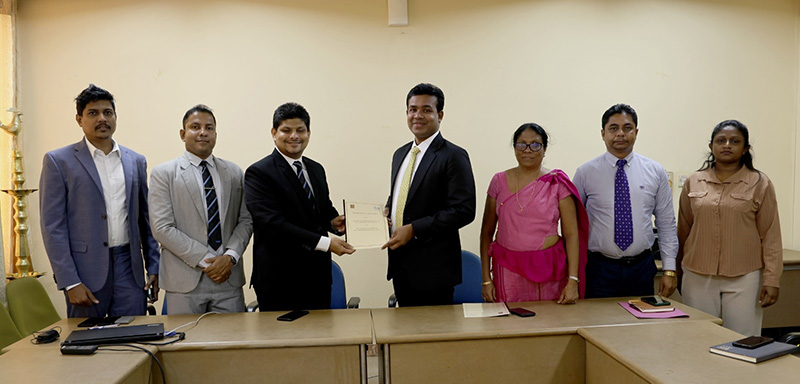Business
Stigma attached to menstruation seen as an obstacle to wide use of sanitary napkins among local women

By Ifham Nizam
Hemas Consumer Brands, through its FEMS line, is on a mission to change the feminine hygiene market in Sri Lanka. Sachini Gamage Welungoda, Marketing Manager for the Feminine Hygiene Category, spoke about the brand’s ambitions, challenges and its commitment to driving positive change. She said, among other things, that the stigma attached to the women’s menstruation cycle locally is one of the biggest obstacles to the wider purchase and use of sanitary napkins among Sri Lankan women.
Despite not being the market leader, FEMS is determined to change the landscape of feminine hygiene in Sri Lanka, she told The Island Financial Review when journalists visited the Hemas Manufacturing Plant in Dankotuwa recently.
Gamage stressed that the brand has been instrumental in introducing an economic range of sanitary napkins, addressing the needs of the 70 per cent of women who do not use these products regularly. “Affordability is just one aspect. We identified that only 30 per cent of females use sanitary napkins regularly, and we wanted to change that, Gamage stated.
The introduction of the economic range was a strategic move to democratize access to menstrual hygiene products. However, the brand’s mission goes beyond mere affordability. FEMS aims to ensure transparency in its processes and co-creation with consumers, believing that this approach will lead to more effective and acceptable products in the market.
FEMS prides itself on its research and development (R&D) team, which, although based locally, brings global knowledge to the table and adapts it to Sri Lankan needs, Gamage said. “We don’t just bring products from outside unless they fit with the Sri Lankan consumer. Our R&D team takes global technology and localizes it to meet the specific needs of our consumers, Gamage explained.
This localized approach ensures that FEMS products are not only affordable but also tailored to the diverse needs of Sri Lankan women. Whether addressing heavy flow or providing a lighter feel, FEMS is committed to offering a range of options that meet various consumer preferences.
Gamage pointed out that one of the most significant challenges in the market is the stigma surrounding menstruation. “The biggest problem is that people are not aware of sanitary napkins and periods are not openly discussed. This taboo creates vulnerability, she said. The lack of awareness, rather than affordability, is the primary reason for the low penetration of sanitary napkins in the market.
Looking ahead, FEMS is focusing on expanding its product range to include premium options that cater to specific consumer needs, such as different flow levels. While the current focus remains on the local market, given its low penetration rate, Gamage hinted at the brand’s potential to explore international markets in the future.
With a 33% market share, FEMS is trailing behind the market leader, who holds 60%. However, with its commitment to innovation, transparency, and consumer education, FEMS is poised to continue its upward trajectory in the Sri Lankan market, Gamage explained.
Business
DMASL Digital Summit 2025 set for July 24-25 in Colombo

The Digital Marketing Association of Sri Lanka (DMASL) has announced the DMASL Digital Summit 2025, South Asia’s ‘most anticipated’ digital innovation forum, scheduled for July 24–25 in Colombo. Marking its third edition, the summit is poised to be the largest and most transformative yet, uniting many industry leaders, creators, and visionaries to shape the region’s digital future.
Under the theme “Where Asia’s Digital Minds Converge,” the 2025 summit amplifies its role as a catalyst for cross-border collaboration and cutting-edge strategies. This year’s agenda spotlights Asia’s rapid digital evolution, offering a dynamic platform for professionals driving transformation in marketing, technology, and commerce.
The event will feature the following.
Visionary keynotes from global pioneers in AI, data analytics, and digital commerce. Masterclass workshops on AI-driven marketing, omnichannel strategies, and ROI optimization. Interactive innovation zones featuring live tech demos, VR/AR experiences, and startup pitch sessions. Regional success stories through case studies from top brands and emerging disruptors and Hyper-targeted networking with C-suite executives, policymakers, and content creators.
Business
LIC Lanka secures Rs. 2 billion capital infusion from its Indian parent company

Timing aligns with Sri Lanka’s hunger for FDI and LICL’s ambition to shed its low-profile past
In a bold move signaling renewed confidence in Sri Lanka’s economic recovery, Life Insurance Corporation Lanka Ltd (LICL) has secured a Rs. 2 billion capital infusion from its Indian parent company (LIC of India), marking one of the largest foreign direct investments (FDI) in the island’s insurance sector this year.
The injection arrives as Sri Lanka has intensified its efforts to attract global capital while LICL is also positioning itself to reshape the underpenetrated life insurance market through aggressive expansion, tech upgrades, and innovative retirement plans targeting underserved workers in the private sector and in the informal economy.
LICL, a 23-year-old joint venture between LIC India (97% stakeholder) and Bartleet Transcapital (3%), plans to leverage the fresh funds to overhaul its IT infrastructure, streamline its 24-branch network, and launch private-sector retirement schemes – among other products including investment plans – tailored for informal and private-sector employees lacking retirement coverage.
LIC Lanka’s new MD/CEO Prameela Chittazhi Ramanadhan, a 27-year LIC India veteran, told The Island that the timing aligns with ‘Sri Lanka’s hunger for FDI’ and LICL’s ambition to shed its ‘low-profile’ past.
“This investment isn’t just capital. it’s a vote of confidence from our parent company in Sri Lanka’s potential,” Prameela asserted. “We’re addressing critical gaps: only 0.5% of GDP comes from life insurance, and millions lack pension safety nets. Our new products will redefine accessibility to this segment,” Prameela CR said.
A portion of the funds will modernise LICL’s digital infrastructure to fast track claims processing and customer service, a critical step as the insurer seeks to rebuild trust in a sector still scarred by the 1960s nationalisation of foreign firms.
“Trust is earned through consistency. In 23 years, not a single customer has accused us of unmet promises,” Prameela noted, hinting at upcoming campaigns showcasing client success stories.
LICL’s push comes amid lingering skepticism toward life insurance, partly rooted in societal beliefs. The 1961 nationalisation of insurers, which forced foreign players to exit, left a legacy of public wariness. Prameela CR acknowledged the challenge but expressed optimism: “We’ve operated here for decades without controversy. Now, we’ll be louder about our track record,” she said.
Prameela CR , a law graduate who rose through LIC India’s ranks since 1997, brings cross-functional experience to her role. Her strategy hinges on ‘localised innovation,’ blending LIC India’s global scale with targeted products for Sri Lanka’s ground realities.
Post-capital infusion, LIC Lanka is poised to be no longer the quiet player.
With insurance penetration languishing at 0.5% of GDP, far below regional peers like India (3.2%) – LICL’s gamble hinges on convincing Sri Lankans that life insurance isn’t a luxury but a necessity.
“The pension push could tap into growing anxiety over retirement security as the population ages,” LIC Lanka said.
As FDI-starved Sri Lanka watches, LICL’s Rs. 2 billion bet may prove a litmus test for foreign insurers eyeing the island’s untapped potential.
Industry analysts say LICL’s Indian pedigree could bolster its credibility. LIC India, the world’s third-strongest insurance brand, manages over $500 billion in assets, offering LICL technical expertise and actuarial firepower.
By Sanath Nanayakkare
Business
SLIM partners with IDB to promote national industry excellence

The Sri Lanka Institute of Marketing (SLIM) and the Industrial Development Board (IDB) have entered into a significant Memorandum of Understanding (MoU) aimed at promoting the development of Local Industries and enhancing the recognition of Sri Lankan Brands on both Domestic and International platforms. The MoU, marks a new chapter in collaboration between these two key institutions, with a strong focus on fostering Innovation, encouraging Excellence, and promoting Sustainable Industrial Growth in Sri Lanka.
Under the agreement, SLIM will play a key role in Training and Capacity-Building initiatives for the IDB’s island-wide staff, equipping them with the Marketing and Brand Management skills necessary to support Local Businesses. This collaboration is expected to enhance the overall performance of Sri Lankan Brands by improving Communication Strategies, Corporate Culture, and Market Competitiveness.
The MoU will also focus on to the National Industry Brand Excellence Awards, an initiative by the IDB to recognise outstanding achievements in the Industrial sector.
-

 Business6 days ago
Business6 days agoAitken Spence Travels continues its leadership as the only Travelife-Certified DMC in Sri Lanka
-

 Latest News5 days ago
Latest News5 days agoNPP win Maharagama Urban Council
-

 Business6 days ago
Business6 days agoLinearSix and InsureMO® expand partnership
-

 Business4 days ago
Business4 days agoJohn Keells Properties and MullenLowe unveil “Minutes Away”
-

 Features1 day ago
Features1 day agoSAITM Graduates Overcome Adversity, Excel Despite Challenges
-

 Sports1 day ago
Sports1 day agoASBC Asian U22 and Youth Boxing Championships from Monday
-

 News1 day ago
News1 day agoDestined to be pope:Brother says Leo XIV always wanted to be a priest
-

 Foreign News2 days ago
Foreign News2 days agoMexico sues Google over ‘Gulf of America’ name change












